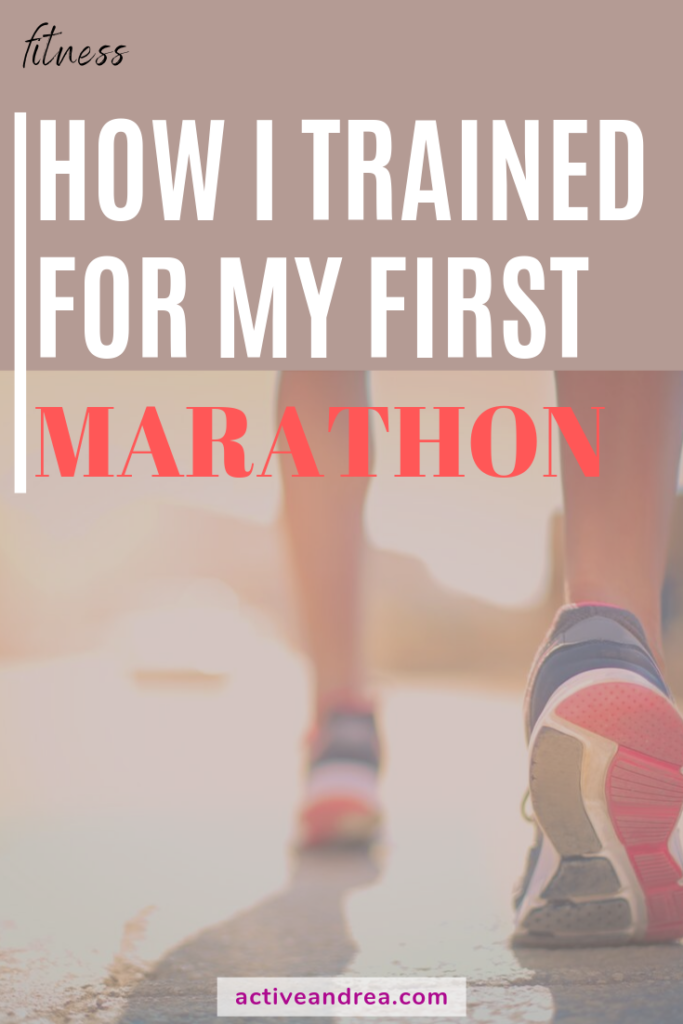Disclosure: This post may contain affiliate links, meaning I get a commission if you decide to make a purchase through my links, at no cost to you.
Training for your first marathon feels a bit like trudging through a dark tunnel. You can see just far enough ahead that you’re not stumbling blind, and you know the tunnel will eventually end, but many days you doubt whether you’re going to reach it. It’s a soul-testing, feet-searing, skin-chafing endeavor.
And entirely worth it.

I ran my first marathon in June of 2018, a week shy of my 26th birthday. What better way to ring in 26 years of life than run 26 miles?
To train for my first marathon, I did what many people in the same position likely do: I googled “marathon training plan.”
My goal for this first marathon was to run a Boston-qualifying time, which for my age group is 3 hours and 35 minutes or faster (Note: for 2020 Boston qualification, this has changed to 3 hours and 30 minutes).
To guide me, I selected this 16-week training guide from Runner’s World UK that promised to train me for a sub-3:30 marathon finish.
The Build Up to Training
Based on my race date, my training guide had me starting near the end of February. But I knew I couldn’t hibernate through the holidays and simply emerge from my couch cave, coated in Christmas-cookie blubber, on day one of training.
Or, I suppose I could have, but I likely would have quit two miles in.
I started running 3-5 times a week starting in November. I kept it this pre-training period pretty casual, running between 3 to 6 miles for most runs and regularly doing strength and HIIT workouts 1-2 times a week.
The 16-Week Plan
Feel free to skim this next portion if you’re not a running nerd. If you are, however, I have summarized my marathon training by weekly mileage, comparing the scheduled mileage to what I actually completed, as well as the long run distance and pace I did each week.
As you can see from the below data, I struggled to maintain the assigned weekly mileage goals for this training plan. If I was being optimistic, I might claim some training mileage is missing – the weekly mileage here consists only of the runs I logged with my Garmin watch.
But, in all honesty, I think I just failed to execute the training plan to perfection. While not ideal, it’s okay. Any seasoned runner will tell you that training will always be a roller coaster of good and bad days or weeks.
Week 1
Long Run: 9 miles, 9:03 min/mile pace (Goal: 10 miles)
Total Miles, Actual vs. Goal: 27.29 miles vs. 26 miles
Week 2
Long Run: 10 miles; 8:55 min/mile pace (Goal: 11 miles)
Total Miles, Actual vs. Goal: 33.7 miles vs 32 miles
Week 3
Long run: 12.61 miles; 8:48 min/mile pace (Goal: 13 miles)
Total Miles, Actual vs. Goal: 28.67 miles vs. 35 miles
Week 4
Long run: 7 miles; 8:43 min/mile pace (Goal: 8 miles)
Total Miles Actual vs. Goal: 16.06 miles vs. 31 miles
Week 5
Long Run: 15 miles; 9:07 min/mile (Goal: 15 miles)
Total Miles, Actual vs. Goal: 21.1 miles vs. 39 miles
Week 6
Long Run: None (Goal: 18 miles)
Total Miles, Actual vs. Goal: 22.6 miles vs. 43 miles
Week 7
Long Run: 18 miles; 8:43 min/mile pace (Goal: 20 miles)
Total Miles, Actual vs. Goal: 37.05 miles vs. 47 miles
Week 8
Long Run: 9 miles; 7:49 min/mile pace (Goal: 15 miles)
Total Miles, Actual vs. Goal: 21 miles vs 36 miles
Week 9
Long Run: 20 miles; 8:40 min/mile pace (Goal: 20 miles)
Total Miles, Actual vs. Goal: 34.32 miles vs. 48 miles
Week 10
Long Run: 15 miles; 8:36 min/mile pace (Goal: 15 miles)
Total Miles, Actual vs. Goal: 35 miles vs. 39 miles
Week 11
Long Run: 20 miles; 8:28 min/mile pace (Goal: 20 miles)
Total Miles, Actual vs. Goal: 37.43 miles vs. 46 miles
Week 12
Long Run: 22 miles; 9:08 min/mile pace (Goal: 22 miles)
Total Miles, Actual vs. Goal: 50 miles vs. 48 miles
Week 13
Long Run: 18 miles; 8:50 min/mile pace (Goal: 20 miles)
Total Miles, Actual vs. Goal: 34.35 miles vs. 45 miles
Week 14
Long Run: None (Goal: 18 miles)
Total Miles, Actual vs. Goal: 10.37 miles vs. 42 miles
Notes: Yikes…probably my worst week. No recollection of why I fell off the training bus so hard this week, but hey, just goes to show we all have bad training weeks.
Week 15
Long Run: 12 miles; 8:27 min/mile pace (Goal: 12 miles)
Total Miles, Actual vs. Goal: 23.54 vs. 31 miles
Week 16
Long Run: None (Goal: None)
Total Miles, Actual vs. Goal: 0 miles vs. 13 miles
Notes: After compiling all this data, I realized I only did 15 weeks of training instead of the 16 weeks on the calendar. Whoops.
Marathon Finish Time: 3:33:14 (8:08 pace), BQ (Woo!)
Even though I didn’t hit my training plan even close to perfect, I still managed to hit my goal of running under 3 hours and 35 minutes.
What Helped Me in the Race
Despite my unbalanced and rather inconsistent mileage (betraying my own consistency creates results advice), the race itself went pretty smoothly. Here are the three reasons I believe it did.

1. I Had a Race Partner
I was very lucky to run my first marathon with one of my best friends from college. We ran nearly every step of the race together, crossing the finish line hand in hand. Without her, I probably would have strained to keep it together mentally. The first few miles we chatted and expelled our nerves together. During the much quieter second half, after the many half-marathoners had dropped off, we made small observations and helped each other stay sane.
If you have a friend or training partner your speed, I highly recommend running a race together. The incredible experience of running a marathon is even better when you share it with someone else.
2. I Did Long Runs Over 20 Miles
As we steadily clicked off 8-minute miles, I could have panicked that I was running nearly a minute faster per mile than most of my training runs. A good old-fashioned mid-race panic wouldn’t be anything new for me, but I kept my cool. Partially because I had my friend with me and partially because I knew, at least, I had done the mileage. Doing those 20 and 22 mile long runs probably helped me mentally as much as they did physically.
This isn’t training advice, necessarily, as there are all sorts of ways to train for the endurance portion of a marathon, both physically and mentally. But I do think, for me, running that far helped.
3. Race Adrenaline
Despite the duration of the marathon, my focus and determination did not waver throughout. There is an excitement factor about racing a new distance for the first time that I believe makes it easier to cope with and, at times, even forget the pain. I felt this way during my first half-marathon too.
Finishing brought a storm of deep muscular exhaustion and endorphin induced euphoria. It’s weird to me that we can get a runner’s high from both three miles and twenty-six. You’d think after a certain distance our bodies would just, like, get over it.
But no. Crossing the finish line felt like crossing the finish line of a 5k or 10k or half-marathon. (It did not feel like crossing the finish line of an 800-meter race. Finishing an 800-meter race would feel like the insides of my lungs had been clawed by an enraged, perhaps spiteful, cat.) I had the wonderful feeling of accomplishment and, even better, the reward of sitting and food.
Although I wish I had trained more consistently for this first race, I’m super satisfied with how we did.
Training for YOUR First Marathon
Let’s not sugar coat it. If you’ve never committed the discipline to a long-term challenge before – an athletic endeavor, a degree or certification, weight loss – training for a marathon might feel awfully hard mentally. If you’ve never been a consistent runner, training for a marathon will also be tough physically.
Put those two together and you’ve got yourself a real challenge. Which is great! A challenge can be a major gift, regardless of whether you succeed or fail.
If you truly want to run a marathon, it’s yours for the taking.
The key is to train smart. By this I mean, start slow and stay consistent. Also, do your drills, core exercises and hip mobility exercises. These keep the gears churning smoothly.
Among the oceans of marathon training material on the internet, here are some marathon training guides you might find useful:
For Beginners (Currently Running 15 to 25 miles a week)
This 20-week marathon training schedule created by Josh Clark, the founder of the Couch to 5k program, builds from 14 miles a week to a peak of 45 miles. He also provides a pre-training schedule to make sure you don’t get injured.
Read the plan here.
For First-Timers Short On Time
Created by the Furman Institute of Running and Scientific Training (FIRST), an academic research lab within Furman University in Greenville, South Carolina, this training plan mandates only 3 days a week of running, starting with a long run of 8 miles and ending with a long run of 20 miles. FIRST founder and lead researcher Bill Pierce has served as an endurance training resource to Runner’s World, the New York Times, and National Geographic, among others.
Get the guide here.
For Non-Runners
Author and running coach Matt Fitzgerald created this plan for Women’s Running (though there’s no reason it wouldn’t work for a man) that gets you from couch to marathon in 24 weeks. The plan is split up into four stages: 5k training, 10k training, half-marathon training, and, finally, marathon training.
Check out the plan here.
Other First-Time Marathon Running Resources
Why You Shouldn’t Choose a Training Plan Based on a Time Goal by Matt Fitzgerald (hmm…I probably should have read this article before choosing my marathon training plan)
Three Signs You’re Ready to Move to the Marathon by Greg McMillan
Guide to Marathon Race Day Nutrition by Asker Jeukendrup, PhD and former director of the University of Binghamton Human Performance Lab
Not ready for a marathon quite yet? You might like these:
How to Train Your Brain for Better Runs
Burn 500 to 1,000 calories with this Tread & Strength Workout




That is amazing!